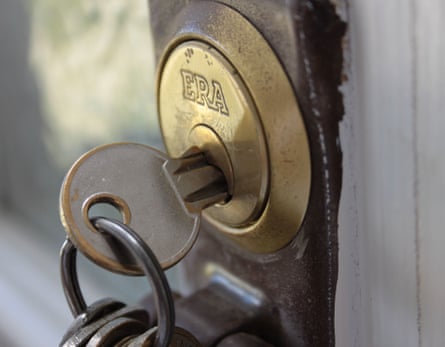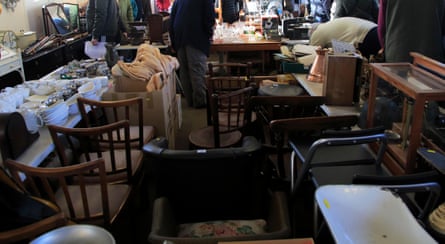Make it safe
When someone close to you dies, be it a relative or a friend, practical considerations may be far from your mind. But you could quickly find that you have the responsibility of looking after, then clearing out, their home.
How their possessions, property and finances will be dealt with should be outlined in the will, if there is one. This should also name who the executor or executors of the estate are – the people legally responsible for carrying out the wishes of the deceased. They will take responsibility for the property.
Before the will is read it is important to ensure that it and other important paperwork such as property deeds, insurance documents and bank statements are kept safe if the person’s house or flat is going to be empty.
As soon as you can, empty the fridge of perishable food and dispose of plants and flowers from inside the house. Cancel any regular deliveries such as milk and newspapers. Ensure the property is locked up and retrieve any spare keys from hiding places.

If there is no will, the most “entitled” person can apply to be the administrator. This will be the closest living relative, normally the spouse followed by any children over 18.
Tell the insurer
If the property is going to be empty it is important to contact the insurer once the homeowner dies.
You may need to provide it with evidence that you are authorised to administer the property such as a death certificate or a lasting power of attorney document.
You may have to take extra steps to ensure it is secure, such as draining the water system, checking any burglar alarm is working and keeping the heating to a suitable temperature during the winter.
Most standard home insurance policies don’t fully cover properties left empty for more than 30 to 60 consecutive days. If that will be the case, an extension to the policy might be needed to prevent against fire, theft or flooding for example. The cost of this depends on the insurer.
Sort as you go
When you start the clear-out proper, be methodical and put items into categories. The will may say that some items such as jewellery are to be given to specific people, and so you may want to begin by finding these things.
Just Clear, a London-based house clearance company, suggests you work from room to room and put items into categories as you go. You could get some cardboard boxes to sort the smaller things into.
Some things such as furniture may have to be sold or auctioned off; others may be sent to a charity shop; things that have no use and are not wanted may only be appropriate for the tip. If in doubt about whether an item has any value, look it up online before you sling it in the recycling.

Even if you aren’t able to remove the items from the property, because probate is being dealt with, you can make an inventory of what is there. Once probate is confirmed, you can distribute the items to family members and friends of the deceased.
Pay for help
There are lots of reasons why you may want to get the experts in to do it for you. Clearing out the home of a loved one can be a daunting task, especially if you are dealing with a lifetime of possessions. Or you may live far away and may not be able to manage the whole thing yourself.
House clearance firms specialise in taking the responsibility of emptying a home away from family or friends. Brendan O’Shea, the chief executive of Just Clear, says people sometimes think they can do the job themselves but then find they are swamped, or simply do not have the time.
“We get calls from Australia, America – all over the world,” he says. Some people are very good at getting their affairs in order, others are very different. It is all down to the individual, O’Shea adds.
“I’ve got clients who are prolonging the clearance process because they cannot emotionally deal with it. They can’t process it in their head. And when they do try to approach it, it gives them anxiety,” he says.
Typically, a professional house clearance service should clear the property, taking over the sorting and recycling and, in some cases, moving items to an auction house. It may also sell items on your behalf, taking a commission in the process. You may also be able to get it to take care of cleaning of the property, too, if this is needed.

O’Shea says that an average three-bedroom house – in which one person was living – will take his company a day to clear. This would cost the estate £1,700 (plus VAT) and includes recycling charges, and haulage and labour, among other expenses.
In some cases, the clearance turns up valuable items that loved ones did not know were there. O’Shea says his company found two Picasso ceramics in a house in Knightsbridge, London – they subsequently sold for £120,000.
For those who believe that items in a home are worth more than they are, he says that auctioning them will show what the market values them at.He says an auction is a good way of finding out how much something is worth. You may think something is a valuable antique, but by taking it to an auction you can find out how much the market will pay for it.
He says the low bar for entry to become a clearance company means it “is not a nice industry”. In order to distinguish between companies, look at online reviews for them and how long they have been in the business. Recommendations from local friends or relatives will also help you choose a good company.
Inform organisations
Some organisations will need to be told of the death. Many councils use the Tell Us Once system, which notifies most government organisations in one go. The registrar will give you the details and a number when you register the death. The system will tell HM Revenue and Customs, the Department for Work and Pensions, the Passport Office and the DVLA among others. You will need the personal details of the deceased, and possibly documents such as passport and driving licence.
Age UK says if the council is not part of the service, you will have to contact the organisations yourself. The name of deceased can be put on the Bereavement Register, which removes them from mailing lists and stops advertising mail.
You should also contact pension providers, banks, trade unions, mortgage providers, their GP, dentist and optician, as well as any charities to which they may have made subscription payments.
Don’t rush
Dealing with the death of a friend or a loved one does not have to be rushed. The insurer L&G advises people to clear out a home with someone else and to do it over different days in order to avoid emotional fatigue. Just Clear says it can often take several weeks to sort through the remains of someone’s life and it is vital to give yourself time to reflect.
Charities are available to help. Cruse Bereavement Support has helplines to help those who have lost someone, while Marie Curie also has a helpline. Citizens Advice has advice on the steps that need to be taken after a death.

.png) 1 month ago
58
1 month ago
58

















































